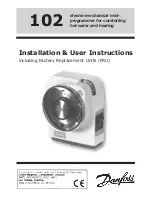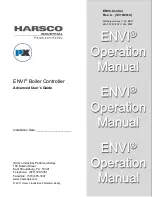
iCNC Performance
Manual 0-5401
SAFETY INSTRUCTIONS
1-3
CYLINDER HANDLING -- Cylinders, if mishandled, can rupture and violently release gas. Sudden
rupture of cylinder, valve, or relief device can injure or kill. Therefore:
1. Use the proper gas for the process and use the proper pressure reducing regulator designed to operate
from the compressed gas cylinder. Do not use adaptors. Maintain hoses and fittings in good condition.
Follow manufacturer’s operating instructions for mounting regulator to a compressed gas cylinder.
2. Always secure cylinders in an upright position by chain or strap to suitable hand trucks, undercar-
riages, benches, walls, post, or racks. Never secure cylinders to work tables or fixtures where they
may become part of an electrical circuit.
3. When not in use, keep cylinder valves closed. Have valve protection cap in place if regulator is not con-
nected. Secure and move cylinders by using suitable hand trucks. Avoid rough handling of cylinders.
4. Locate cylinders away from heat, sparks, and flames. Never strike an arc on a cylinder.
5. For additional information, refer to CGA Standard P-1, “Precautions for Safe Handling of Compressed
Gases in Cylinders”, which is available from Compressed Gas Association, 1235 Jefferson Davis
Highway, Arlington, VA 22202.
EQUIPMENT MAINTENANCE -- Faulty or improperly maintained equipment can cause injury or death.
Therefore:
1. Always have qualified personnel perform the installation, troubleshooting, and maintenance work. Do
not perform any electrical work unless you are qualified to perform such work.
2. Before performing any maintenance work inside a power source, disconnect the power source from
the incoming electrical power.
3. Maintain cables, grounding wire, connections, power cord, and power supply in safe working order.
Do not operate any equipment in faulty condition.
4. Do not abuse any equipment or accessories. Keep equipment away from heat sources such as furnaces,
wet conditions such as water puddles, oil or grease, corrosive atmospheres and inclement weather.
5. Keep all safety devices and cabinet covers in position and in good repair.
6. Use equipment only for its intended purpose. Do not modify it in any manner.
ADDITIONAL SAFETY INFORMATION -- For more information on safe practices for electric arc weld-
ing and cutting equipment, ask your supplier for a copy of “Precautions and Safe Practices for Arc
Welding, Cutting and Gouging”, Form 52-529.
The following publications, which are available from the American Welding Society, 550 N.W. LeJuene Road,
Miami, FL 33126, are recommended to you:
1. ANSI/ASC Z49.1 - “Safety in Welding and Cutting”.
2. AWS C5.1 - “Recommended Practices for Plasma Arc Welding”.
3. AWS C5.2 - “Recommended Practices for Plasma Arc Cutting”.
4. AWS C5.3 - “Recommended Practices for Air Carbon Arc Gouging and Cutting”.
5. AWS C5.5 - “Recommended Practices for Gas Tungsten Arc Welding“.
6. AWS C5.6 - “Recommended Practices for Gas Metal Arc Welding”.
7. AWS SP - “Safe Practices” - Reprint, Welding Handbook.
8. ANSI/AWS F4.1, “Recommended Safe Practices for Welding and Cutting of Containers That Have Held
Hazardous Substances.”
9. CSA Standard - W117.2 = Safety in Welding, Cutting and Allied Processes.
Summary of Contents for iCNC Performance
Page 6: ...This Page Intentionally Blank...
Page 17: ...iCNC Performance Manual 0 5401 SAFETY INSTRUCTIONS 1 5 This Page Intentionally Blank...
Page 42: ...iCNC Performance 5 2 INPUT POWER Manual 0 5401 This Page Intentionally Blank...
Page 54: ...iCNC Performance 6 12 iHC Manual 0 5401 This Page Intentionally Blank...
Page 84: ...iCNC Performance 7 30 iCNC SETUP Manual 0 5401...
Page 108: ...iCNC Performance A 6 APPENDIX A Manual 0 5401 I...
















































